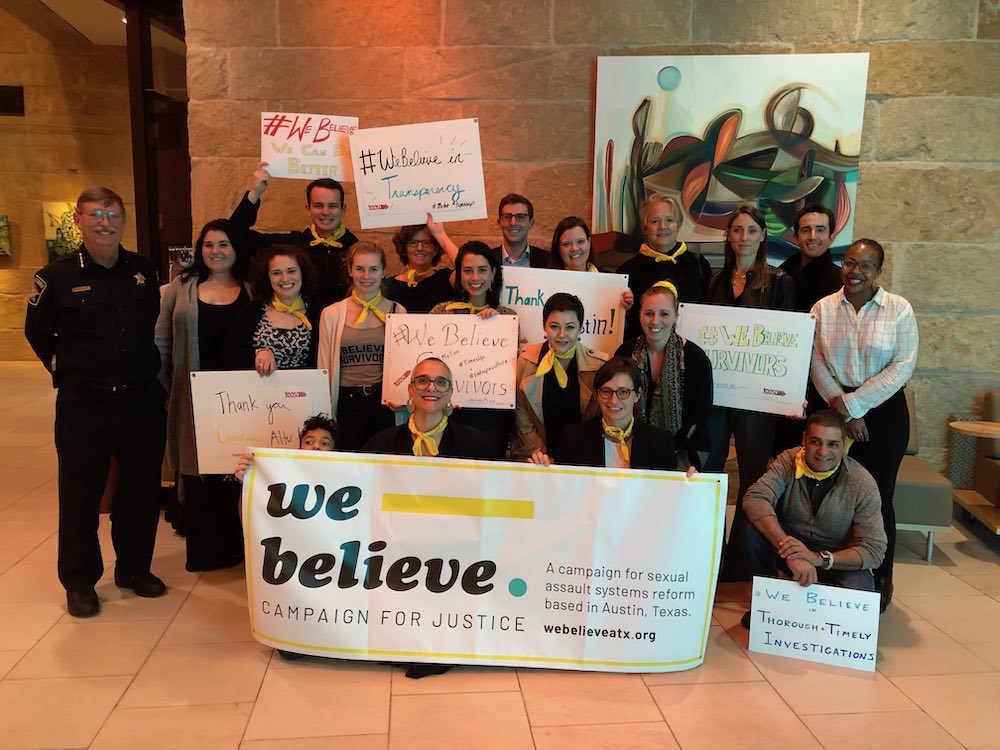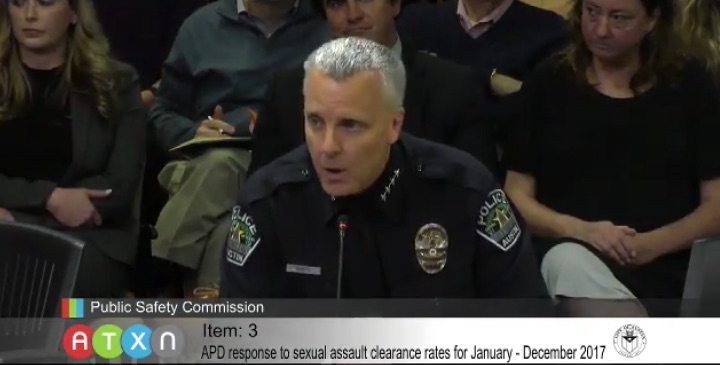UPDATED: Council Calls for Independent Audit of APD's Rape Cases
CM Alison Alter says this is the "next step, not the end of the journey"
By Sarah Marloff, 1:25PM, Wed. Feb. 6, 2019
Updated Wednesday, Feb. 6, 12:15pm:
Days following the unanimous passage of the City Council resolution calling for a comprehensive audit of Austin Police Department’s handling of rape cases, APD Chief Brian Manley confirmed: APD agrees with most of the findings found in the Texas Department of Public Safety’s audit on how APD uses federal clearance codes to close rape cases.
Manley, who has since promised a larger audit of the department’s handling of sexual assault cases, invited DPS to review APD’s use of exceptional clearance” – when a suspect has been identified and located, but for some legitimate reason cannot be arrested – after Austin police received national backlash for too frequently closing rape cases without arresting subjects. In a letter sent to DPS on Monday, Feb. 4, and later to the city’s Public Safety Commission, Manley said that of the 65 cases DPS classified as incorrect, APD concurred with 57.
APD’s internal review team examined each of the 65 cases looking for patterns or identifiable trends. One issue of misclassification, Manley said, has to do with the difference between state law and federal definitions of sexual assault – specifically how it pertains to sex between two minors. APD also disagreed with nine cases that DPS argued should’ve been classified as “unfounded” because the survivors recanted. Instead, Manley said those cases shouldn’t have been cleared exceptionally, but should have been suspended based on the department’s “start by believing” philosophy. Going forward, APD will review the “totality of the circumstances” in cases where survivors recant to decide it the case should be suspended or closed as unfounded. (Either way, those cases will be capable of being reopened.)
Original post, Friday, Feb. 1, 7am:

The City Council resolution calling for a comprehensive audit of Austin Police Department’s handling of sexual assault cases passed unanimously Thursday night, Jan. 31, though Council Member Jimmy Flannigan was absent.
The resolution, brought forth by CM Alison Alter and co-sponsored by Greg Casar, Ann Kitchen, Mayor Pro Tem Delia Garza, and Mayor Steve Adler, directs the City Manager’s Office to hire a nationally recognized, independent entity – free of “any conflict of interests” – to review APD’s handling of reported rapes. The evaluation will look back at the department’s processing and investigation of sexual assault cases to complete a detailed report, along with a set of recommendations to move forward. Auditors will also look into why a “number of reported cases” are not prosecuted within the criminal justice system. Before the vote was taken, Adler said that both Travis County District Attorney Margaret Moore and Austin Police Chief Brian Manley had expressed their support of the resolution.
Council spent almost two hours hearing from supporters of the resolution, including several plaintiffs in the sexual assault class action lawsuit against Austin, Travis County, local law enforcement, and the District Attorney’s Office; members of the city's Commission for Women; advocates for survivors; representatives from SAFE; Chas Moore of Austin Justice Coalition; and Chris Kaise, director of public policy at Texas Association Against Sexual Assault. Ana Rodriguez Defrates, of the Commission for Women, said for the last three years – during which APD has struggled with a DNA lab shutdown, an overwhelming backlog of untested rape kits, and case clearance concerns – she’s felt like “we’re putting out fires one by one.” This resolution, she said, allows the city to take a step back and “understand where the source of that fire is.”
On January 16, Manley also called for a “start to finish” review of APD’s sexual assault cases. Though Alter’s work on Thursday’s resolution predates Manley’s announcement, the need for such an audit has grown ever more clear in light of recent happenings. In November, APD made national news for too frequently closing rape cases using “exceptional clearance” – where a suspect has been identified and located, but for some legitimate reason cannot be arrested. (In 2016, two out of every three rape cases were closed exceptionally, meaning no arrest was made in those cases.) Following national reports, Manley invited the Texas Department of Public Safety to audit the department’s exceptionally cleared sexual assault cases. Of the 95 cases reviewed by DPS, spanning several months in 2017, only 29 were closed correctly in accordance with federal guidelines. Thirty cases failed to meet at least one of the four requirements set forth by the FBI.
The resolution directs the yet-to-be-selected auditor to review either 200 cases or 50% of sexual assault cases – whichever number is greater – from every year for the past seven years. The selected cases must cover a range of “victim types” and included ones that did and did not move forward to prosecution. (Cases still being investigated or pending prosecution are excluded.) However, the auditor may choose to review more cases if desired.
Survivors who reported their rapes to APD, as well as current and former sworn officers and local “subject matter experts” – presumably advocates – will be interviewed. Areas up for review include the department’s adherence to state and federal laws; policies and practices to ensure there are no biases based on the victim’s gender, race, disability, or LGBTQ status; the Sex Crimes Unit’s record-keeping to ensure its accordance with national best practices; and officers’ treatment of victims under the influence of drugs or alcohol. APD’s documentation of warrants and reports in sexual assault cases will be looked at for “any issues.” The audit will also assess whether APD is complying with national best practices and is accurate in its case clearance decisions. Finally, Council has called for a look at the “appropriateness of current staffing, resources, and training provided,” as well as the budget for Sex Crimes in relation to other APD units.
Alter’s resolution, which reached 13 pages when finalized, asserts that the city would “benefit from analyzing, determining, and addressing best practices with respect to victim healing and survivor focused approaches and the barriers that might exist to their implementation.” It also applauds APD for the steps already taken – specifically the DPS audit – but concludes: “yet the root causes of above-average rates of exceptional clearance, the lack of complete testing of some rape kits, low rates of reporting and prosecution may not be revealed” by the “limited review by a peer institution.” Now, the City Manager’s Office is tasked with identifying an entity to conduct the evaluation and developing a contract using input from both the Commission for Women and the Public Safety Commission. Council expects to receive an update in six months, which should include a timeline for completion. In closing, Alter thanked the many speakers and her colleagues for their support and called the resolution the next step, “not the end of our journey. We will be judged not by the resolution but the actions after we get results back.”
Got something to say on the subject? Send a letter to the editor.
A note to readers: Bold and uncensored, The Austin Chronicle has been Austin’s independent news source for over 40 years, expressing the community’s political and environmental concerns and supporting its active cultural scene. Now more than ever, we need your support to continue supplying Austin with independent, free press. If real news is important to you, please consider making a donation of $5, $10 or whatever you can afford, to help keep our journalism on stands.
Sarah Marloff, Feb. 11, 2021
Sarah Marloff, Feb. 11, 2020
March 8, 2024
sexual assault, Alison Alter, Steve Adler, rape case audit, Brian Manley, City Council, Austin Police Department, sexual assault federal class action suit











